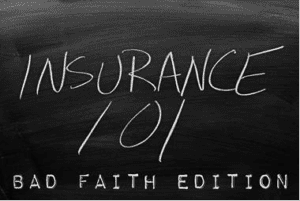Colorado Supreme Court confirms Reasonable Basis Standard for Insurance Bad Faith.
 Colorado is a great place to live if you get into trouble and have to call upon your insurance policy for help, as our state has long been at the forefront of developing insured-friendly law. A recent decision by the Colorado Supreme Court in Schultz v. GEICO Cas. Co., 429 P.3d 844 (Colo. 2018) is yet another step in that direction.
Colorado is a great place to live if you get into trouble and have to call upon your insurance policy for help, as our state has long been at the forefront of developing insured-friendly law. A recent decision by the Colorado Supreme Court in Schultz v. GEICO Cas. Co., 429 P.3d 844 (Colo. 2018) is yet another step in that direction.
In Schultz, the plaintiff was injured in a car accident with another driver. The other driver’s insurer settled with the plaintiff for policy limits, and the plaintiff tendered the remaining claim for uninsured/underinsured motorist benefits to her insurer, GEICO. After months of correspondence, GEICO finally agreed to pay the plaintiff the full $25,000 policy limits. The plaintiff subsequently brought claims against GEICO under C.R.S. §§10-3-1115 and 1116 and for common law bad faith breach of an insurance contract based on what she argued was GEICO’s unreasonable delay in paying the covered benefits. GEICO denied liability, arguing the cause of the plaintiff’s injuries was “fairly debatable” because they could have been caused by preexisting conditions, not the accident. In an effort to support its causation argument, GEICO requested the plaintiff undergo a C.R.C.P. Rule 35 medical examination. Plaintiff objected on the grounds that causation was no longer an issue, and argued the reasonableness of GEICO’s delay had to be evaluated based on the information GEICO had at the time it evaluated her claim and not whatever information was revealed from an after-the-fact medical examination. After the trial court granted GEICO’s request for the exam, the plaintiff filed a petition to show cause under C.A.R. Rule 21.
In analyzing the petition, the Colorado Supreme Court issued two key rulings. First, the court recognized that while a common law claim for bad faith breach of an insurance contract requires insureds to prove insurers acted with knowledge of or reckless disregard of the fact that no reasonable basis existed for denying the claim, statutory claims under C.R.S. §§ 10-3-1115 and 1116 contain no such requirement. Rather, to prevail under those statutes, the Court recognized that “the only element . . . is whether an insurer denied benefits without a reasonable basis.” This ruling is important because, prior to Schultz, this principle had only been articulated by the Colorado Court of Appeals and federal courts interpreting Colorado law. Schultz represents the first time the Colorado Supreme Court recognized the standard, further solidifying it under Colorado law. Second, the Court confirmed the rule that the reasonableness of an insurer’s decision to deny benefits must be evaluated based solely on the information available to the insurer at the time it made its decision. In other words, insurers cannot rely on information or arguments developed after the fact to justify their earlier denial. This is important because it means insurers must pay the benefits under the policy unless they have a reasonable basis at the time they make their decision that the claim is not covered—they cannot simply deny a claim and hope to come up with information later on to validate their actions. Applying these principles, the Court held that it was improper to have ordered the plaintiff to undergo the medical examination, concluding that any newly developed medical evidence would not be relevant to what GEICO knew at the time it made its coverage decision.
Schultz represents another win for policyholders and continues the trend of Colorado’s insured-friendly jurisprudence. For the average policyholder, this means that insurers are further discouraged from improperly denying policyholders the benefits they are entitled to under their policies. In addition, the Schultz case provides a clear basis for insureds to hold insurance companies liable when those companies deny benefits without reasonable basis at the time a coverage decision is made. Policyholders should consult an attorney for further understanding on this topic or if they feel benefits have been improperly withheld under the Schultz standard.
